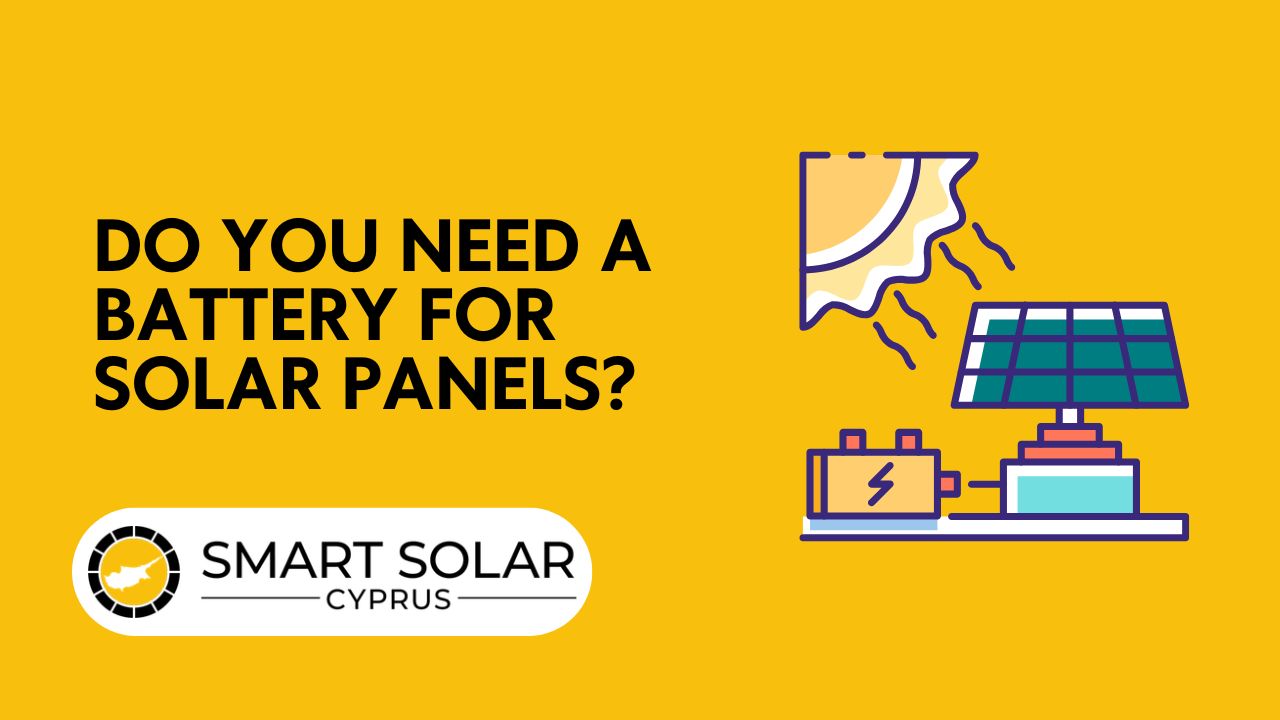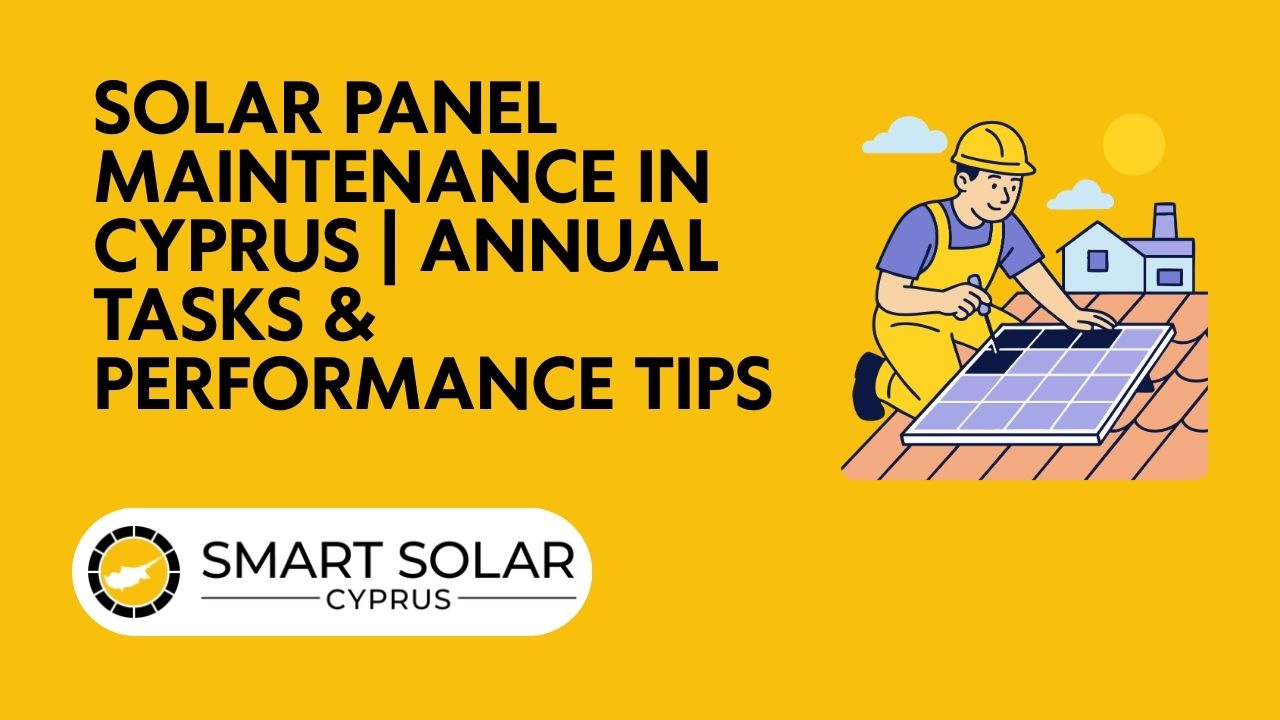Solar panels in Cyprus already provide some of the highest financial returns anywhere in Europe, thanks to high sunshine levels and consistently rising electricity prices. But in recent years, many homeowners are asking a more advanced question: Should I add a battery to my solar system?
Battery storage has become more accessible, more efficient, and more tightly integrated with hybrid inverters. However, it’s not automatically the right solution for every home. The decision depends on your energy usage patterns, lifestyle, home design, and long-term financial goals.
This guide explains the engineering principles behind solar battery systems, how they perform in the Cyprus climate, when a battery is worth the investment, and when a simple PV net-metering system may be more suitable. It also provides real output examples, cost comparisons, and advice on choosing the right battery size.
How Solar Batteries Work in a Cyprus PV System
A solar battery stores excess electricity generated by your PV panels during the day so you can use it at night or during power cuts. It integrates with a hybrid inverter, allowing energy to flow in and out depending on your usage.
Key roles of a battery:
- Store excess PV energy instead of exporting it to the grid.
- Increase “self-consumption” — the proportion of solar energy you use directly.
- Provide backup power during outages (only if configured for backup).
- Optimise energy usage for homes with high night-time consumption.
Without a battery, most PV systems in Cyprus operate on net metering, meaning excess energy is sent to the grid and credited against future consumption.
How Cyprus’ Net Metering Affects Battery Decisions
Cyprus’ net metering system is extremely generous, allowing homeowners to offset a large portion of their daytime production against nighttime usage. This is why many households achieve excellent savings even without a battery.
Net Metering means:
- Electricity exported during the day is credited almost 1:1.
- At night, you withdraw energy without needing storage.
- Monthly bills reflect the net difference.
Because net metering already “stores” your excess electricity in the grid, a battery is not financially essential for every household. However, opportunities for improvement still exist.
When a Battery Is Worth It in Cyprus
Despite the strength of net metering, battery demand is rising. In the following scenarios, adding a battery provides real, measurable benefits.
1. Homes with High Night-Time Consumption
If your home uses a large amount of power after sunset, a battery can significantly reduce your evening grid draw.
Common examples include:
- Families running AC units at night
- Homes using electric water heaters after sunset
- Homes with multiple electronics or gaming systems
- Large refrigerators, freezers, and older appliances
- Pool pumps scheduled for off-peak hours
A battery shifts most of this consumption to free solar energy stored during the day.
2. Homes Considering Future EV Charging
Electric vehicles are becoming more common in Cyprus, especially in Limassol and Nicosia. EV charging typically happens at night, making it a perfect match for battery storage.
Savings are maximised when:
- Charging occurs after sunset
- A 10–15kWh battery is installed
- The inverter prioritises charging the battery before exporting to the grid
EV owners see some of the best returns on battery storage.
3. Homes in Rural Areas with Power Outages
In villages or rural areas, power cuts can occur during storms or grid overloads. A battery provides backup power for essential loads, such as:
- Lighting
- Refrigerator
- Wi-Fi router
- Small appliances
This requires a hybrid inverter capable of backup, along with a “backup circuit” installed by the electrician.
4. Homes Planning Energy Independence or Future Upgrades
Battery systems are not only about economics. Some homeowners prefer energy independence or future flexibility.
A battery is beneficial if:
- You want future off-grid capability
- You expect electricity prices to rise faster
- You prefer to minimise reliance on the grid
- You want to integrate smart home energy controls
Planning early ensures your system is ready for future technologies.
When a Battery Is Not Necessary
Not every Cyprus home benefits financially from battery storage. In the following scenarios, the return on investment may be limited.
1. Small homes with low night-time usage
Single-occupant households, holiday homes, or energy-efficient new builds often use most of their electricity during the day.
If your consumption pattern matches PV production, net metering already works efficiently.
2. Homes without EVs or night-heavy loads
If your major appliances run during the day, storing energy for night use provides little value.
3. Homes with limited budget
Batteries increase total system cost by €2,000–€6,000 depending on size. If this affects your ability to install high-quality panels or a hybrid inverter, prioritise the PV system first.
How Much Can a Battery Save in Cyprus?
Savings depend primarily on:
- Night-time electricity usage
- Battery size
- PV system size
- Inverter configuration
Below is a realistic example for a family home in Cyprus.
Example Scenario: 4kW PV System + 10kWh Battery
Home energy profile:
- Day usage: 30%
- Night usage: 70%
Without battery:
- Daytime PV offsets 80–100% of daytime consumption
- Nighttime electricity comes mostly from the grid
- Annual savings: €1,400–€1,900 depending on usage
With battery:
- 60–90% of night consumption covered by stored solar
- Grid usage drops significantly
- Annual savings: €2,200–€2,900
Additional benefit:
- Reduced dependency on fluctuating tariffs
- Enhanced energy stability
Battery Lifespan and Performance in Cyprus Climate
Cyprus’ hot summers and mild winters affect battery performance differently than in northern Europe.
Key factors affecting lifespan:
- Heat exposure
- Cycle frequency
- Battery chemistry
- Installation location
Typical lifespan:
- Lithium Iron Phosphate (LFP / LiFePO4): 10–15 years
- Lithium NMC: 7–12 years
LFP is more common because:
- It tolerates heat better
- It offers longer cycle life
- It is safer and more stable
Install the battery indoors or in a shaded utility room to avoid overheating during summer.
Choosing the Right Battery Size
Battery sizing must align with your usage patterns. Oversizing leads to longer payback times, while undersizing may fail to cover night-time demand.
1. Recommended Sizes for Cyprus Homes
Small homes (1–2 occupants)
- Battery size: 3–5kWh
- PV system: 3–4kW
- Ideal if daytime usage is moderate
Family homes
- Battery size: 7–10kWh
- PV system: 4–5kW
- Best for mixed usage and AC
Homes with heavy consumption or EV charging
- Battery size: 12–15kWh or more
- PV system: 5–7kW
- Suited for lifestyles with strong evening load
Hybrid Inverters: The Foundation of a Future-Ready System
Even if you do not plan to install a battery immediately, installing a hybrid inverter during the initial PV installation is highly recommended.
Benefits of starting with a hybrid inverter:
- Battery can be added later without rewiring
- Lower future upgrade cost
- Built-in energy management features
- Better efficiency with battery storage
Modern hybrid inverters from brands like Huawei, Deye, Solis, and SMA are engineered for Cyprus’ high-temperature climate.
Financial ROI of Batteries in Cyprus
The payback period of a PV system with a battery depends on:
- Night-time usage
- Tariff prices
- Battery size
- Install cost
- Net metering credits
Typical ROI:
- Without battery: 3–4.5 years
- With battery: 6–10 years
While batteries lengthen payback time compared to PV alone, they offer:
- Greater independence
- Better self-consumption
- Protection from rising prices
- Convenience and resilience during outages
Are Batteries Supported by Cyprus Government Subsidies?
As of 2025:
- PV panels are subsidised under certain schemes
- Battery storage is not heavily subsidised
- Subsidies are expected to expand in the medium term as the grid modernises
It is wise to install a hybrid inverter first, so you can add a battery when subsidies improve.
Backup Power Options in Cyprus
Most homeowners do not realise that not all batteries provide backup during a power outage. Only specific hybrid inverters with backup output and a dedicated backup circuit can do this.
Backup power typically supports:
- Lights
- Internet
- Refrigeration
- Small appliances
It does not typically support:
- Air conditioning
- Electric heaters
- Pool pumps
- Ovens
If backup functionality is important, this should be specified during installation.
Should You Add a Battery to an Existing PV System?
Upgrading an existing system is possible but requires:
- Assessing inverter compatibility
- Potentially replacing the inverter with a hybrid unit
- Evaluating existing cable routes
- Checking roof and wall structural capacity
For homeowners on older string inverters, upgrading to a hybrid model is often worthwhile if future EV charging or increased consumption is expected.
Tldr
A battery can be a powerful addition to a solar system in Cyprus, but it is not essential for everyone. For homes with high night-time usage, EV charging, or rural locations, a battery delivers strong financial and practical benefits. For homes with low consumption or tight budgets, net metering already provides excellent savings.
The most future-proof strategy is to install a hybrid inverter from the start, even if you postpone the battery purchase. This ensures your system remains flexible, scalable, and aligned with the energy landscape in Cyprus as storage technology continues to advance.

How Much Money Can You Save With Solar?










